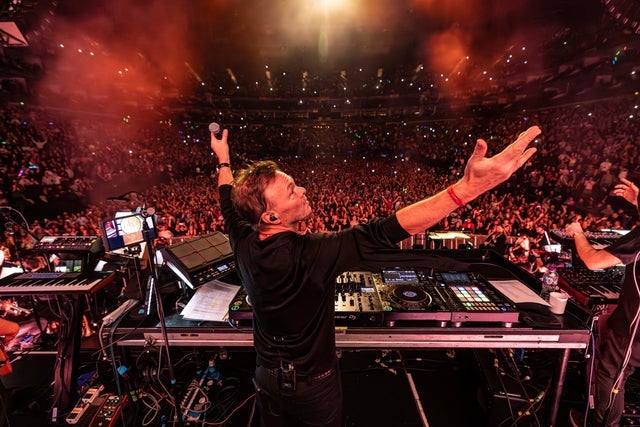Pete Tong cut his teeth on BBC Radio 1 and helped export Ibiza's sound, and now he fronts this orchestral take with Jules Buckley and The Heritage Orchestra.
Radio roots to orchestra lift
The show grew out of a 2015 BBC Prom and has become a large-scale rework of house and trance staples with live strings, brass, rhythm section, and synths. After a pandemic break, the project returned with tighter arrangements and rotating guest singers, shifting more spotlight to the orchestra's attack.
A dance floor that sits down, then stands back up
Expect
Right Here, Right Now,
Insomnia,
Children, and
Born Slippy, stitched to keep the groove steady while dynamics rise and fall. The crowd spans club veterans, younger dance fans, and curious classical listeners, most in relaxed gear and ready to move without pretense. You notice pockets of dancers near the aisles and groups who sing the bass lines as loudly as any chorus. Trivia: the early sessions led to the
Classic House and
Ibiza Classics albums that introduced this format to many who never made it to Ibiza. Another small quirk is how short melodic tags from older white-labels appear as transitions, a wink to crate history. Take the set list and staging notes here as educated impressions, since this show shifts details from run to run.
Pete Tong crowd notes and scene snapshots
Dress codes: past meets present
The scene feels cross-generational, with vintage club tees, smart sneakers, and a few bucket hats nodding to 90s terraces. People often warm up early, chatting about past seasons on the island and which versions they hope to hear.
Shared rituals, no fuss
Expect call-and-response moments on the
Insomnia "I can't get no sleep" line and wordless chants on
Born Slippy. Merch leans to bold rave fonts, pastel gradients, and tour-year back prints, plus scarves that end up waving during peaks. During breakdowns the crowd claps on twos and fours like a DJ set, then goes quiet for string intros before the drop lands. Groups trade knowing smiles when a hidden motif surfaces, and strangers high-five when the timpani boom locks with the kick. It is celebratory without being rowdy, and people make space for dancing near aisles while still treating it like a concert.
Pete Tong under the hood: musicianship and sound
Orchestral bones, club heart
Vocals usually come from rotating guest singers, with keys adjusted to sit well for live voices while keeping the songs recognizable. Arrangements push strings to carry arpeggios that would be synth lines, and brass often takes the lead on hooks so the pulse feels physical. A compact rhythm team layers live kit, electronic pads, and bass guitar with sub synth, giving the low end both thump and shape.
Jules Buckley runs tight tempo maps so
The Heritage Orchestra can hit club-like drops without drifting.
Small tweaks, big impact
One insider detail: many numbers sit a notch under 128 BPM to let big rooms breathe, and a few choruses are reharmonized to open brighter string voicings. Expect quick cut edits between tunes, with short drum breaks acting like DJ blends so momentum never sags. Lights tend to paint broad color washes and strobes on the main accents, supporting the music instead of stealing focus. When the beat pulls away, you hear woodwinds and harp outline pads, then the kick returns and the room leans forward again.
Pete Tong's kindred on the circuit
Kindred big-room instincts
Fans of
Fatboy Slim tend to click with this show because big-beat hooks and cheeky samples become bold brass lines and rhythm hits.
Eric Prydz followers will appreciate the tension-and-release pacing, as builds stretch over minutes before a clean drop.
Melody-first dance energy
If you like
Above & Beyond, the communal sing-along energy of classic trance melodies is mirrored here by strings and choir-style backing vocals. People who track
Disclosure for crisp house grooves will hear similar punch in the live drum and bass combo anchoring the orchestra. All four acts speak to euphoric dance music, and their fans often value crowd connection and melody over pure noise.



